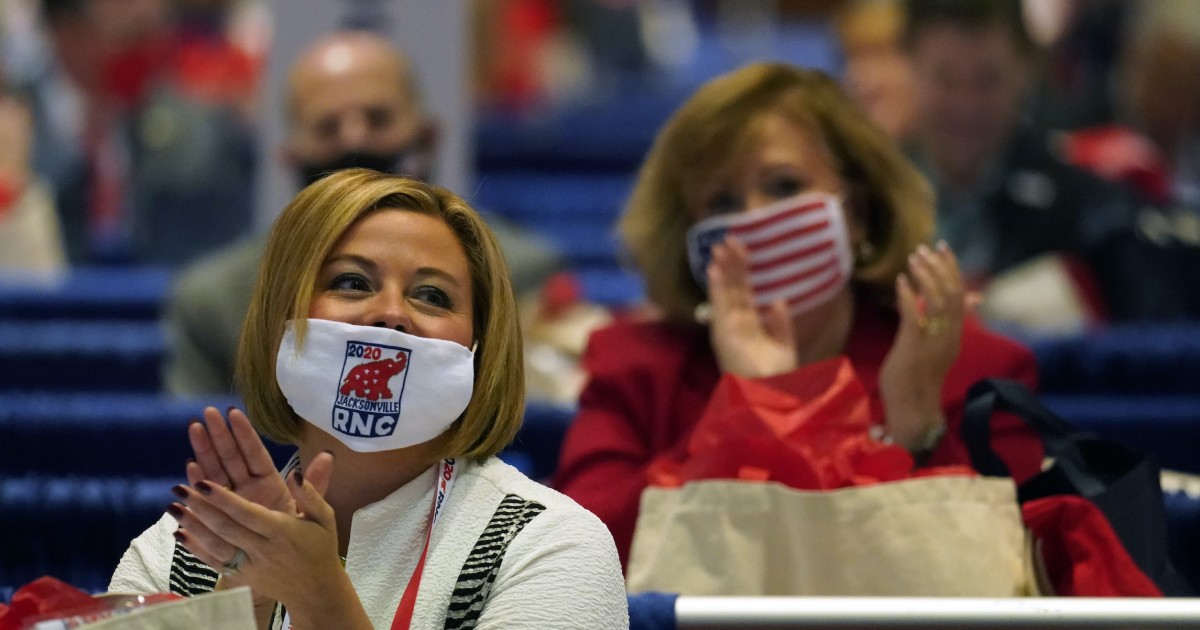
The number of coronavirus cases reported Sunday, roughly 34,500, was the lowest since late June, making it the eighth straight day that new cases fell below 50,000.
The seven-day average number of new cases has been lower than the 14-day average for about a month, a good sign that suggests the outbreaks over the summer have come under control.
Several of the hardest-hit states are also seeing seven-day averages that are lower than 14-day averages. California, for example, has a 14-day average number of cases of about 7,900, with a seven-day average of 6,777. Georgia, Texas, and Tennessee, all also previously hot spots, have similarly seen a downward trend.
Lower daily case counts, a positive sign that the coronavirus pandemic is abating, may also be partly a reflection of national declines in testing. The seven-day average number of tests fell from 814,000 at the end of July to 674,000 through Sunday, according to COVID Tracking Project. Yet the share of tests that come back positive has fallen, suggesting that cases are declining because the outbreak is easing. The weekly average positivity rate declined from 7.7% to 6.2% in the most recent reading, according to the Johns Hopkins Coronavirus Resource Center.
Several hot-spot states have also seen declines in daily testing numbers, suggesting that daily case counts are inaccurate. The daily caseload in Florida, the virus epicenter, is the lowest seen in the state since June 15, but the current death average is still above where it was in early to mid-July. Florida’s overall testing slowdown has continued for weeks. The seven-day average for new tests was 69,581 through Sunday. That’s about 28,000 fewer daily tests than the state was reporting on average during the last week of July.
The number of cases across the United States surpassed 5.7 million over the weekend, and more than 177,000 people have died.
President Trump opened the 2020 Republican National Convention Monday with a warning that Democrats are “trying to steal the election from the Republicans” with universal mail-in voting.
“What they’re doing is using COVID to steal an election. They’re using COVID to defraud the American people,” Trump said.
The president called the Democrats’ efforts to facilitate mail-in voting “the greatest scam in the history of politics” and the fall fight one of the most important ever.
Republicans believe Trump will benefit from Democratic presidential candidate Joe Biden’s comments last week that he would be willing to reimpose an economic lockdown if scientists told him it was needed to neutralize the coronavirus.
“I have to stop everything and start writing ads against Democrats with ‘I would shut it down,’” Republican media consultant Brad Todd said Friday evening, soon after a clip of Biden’s interview aired. “This is the biggest break of the year for Republicans in this campaign year.”
Trump is attempting to come from behind against the former vice president, who leads nationally and in key battleground states as the GOP convention begins.
An information technology worker in Hong Kong tested positive for the coronavirus for the second time after more than four months, leading a group of researchers at the University of Hong Kong to conclude that “there is evidence that some patients have waning antibody level after a few months.”
The 33-year-old worker recovered from COVID-19 and was discharged from the hospital in April after testing negative for the virus. When he tested positive a second time, he was not showing symptoms. Researchers examining the patient found that the genetic sequencing of the virus was “clearly different” from April to August, proving the patient picked up a second infection in August and was not a “persistent carrier” of the virus.
Poverty fell and incomes rose during the early months of the pandemic thanks to government relief, according to a study circulated Monday by the National Bureau of Economic Research.
“We further show that in absence of the stimulus payments and expanded unemployment insurance, poverty would have risen sharply,” the study concluded.
The poverty rate fell by 1.5 percentage points from the winter to late spring, and incomes also rose across the board despite the fact that employment rates fell by 14% in April, the largest one-month decline on record.
The Environmental Protection Agency approved the first disinfectant that offers long-lasting protection against the coronavirus, continuously killing the virus for seven days.
“This is a groundbreaking step [that is] expected to provide longer-lasting protection in public spaces, increasing consumer confidence, and resuming normal air travel and other activities,” EPA Administrator Andrew Wheeler said Monday.
The EPA’s approval of the disinfectant, SurfaceWise2, only applies in Texas for use on American Airlines facilities and planes and at two locations of the Texas-based Total Orthopedics Sports and Spine Clinics. Wheeler said SurfaceWise2’s maker, Allied BioScience, has also applied for widespread approval, which would allow the product to be used on all surfaces.
China has been administering its own coronavirus vaccine to healthcare providers and other high-risk populations since July, the Washington Post reported Monday. Zheng Zhongwei, head of China’s coronavirus vaccine development program, said on a state-run media broadcast Saturday that the vaccine had been approved for use on July 22 under “urgent use” protocols.
He added that authorities are considering expanding the inoculations this fall to employees of food markets, transport systems, and service industries.
“In order to prevent the disease spread in the fall and winter, we are considering a moderate expansion in the program,” Zheng said. “The purpose would be to first build an immunity barrier among special groups in the population.”
